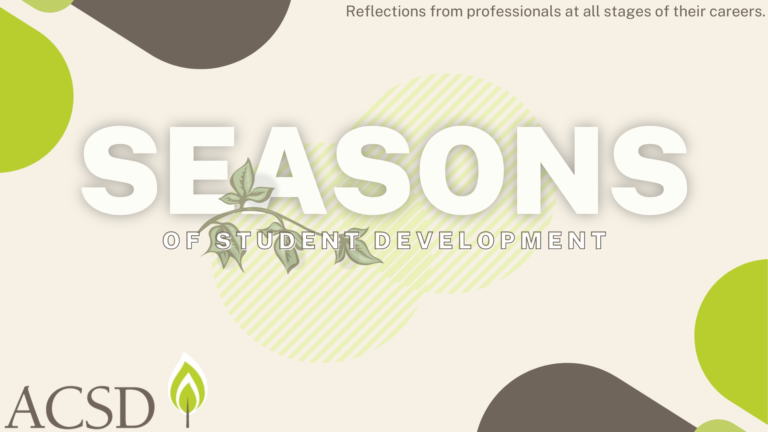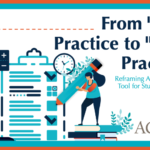![]() This content is brought to you by the Association for Christians in Student Development (ACSD), a volunteer membership organization committed to equipping and challenging faithful professionals to infuse their Christian faith into student development practice and scholarship. Thoughtful content such as this is made possible by volunteer contributions and the financial support of membership dues. Interested in becoming a member for more awesome content just like this? Join today by clicking here!
This content is brought to you by the Association for Christians in Student Development (ACSD), a volunteer membership organization committed to equipping and challenging faithful professionals to infuse their Christian faith into student development practice and scholarship. Thoughtful content such as this is made possible by volunteer contributions and the financial support of membership dues. Interested in becoming a member for more awesome content just like this? Join today by clicking here!
Leading Faithfully in the Ordinary Moments
After graduating from college two years ago, I made the exciting decision to move to Lithuania and begin the next stage of my life as a Resident Director at LCC International University. As a young professional newly stepping into the world of higher education, I have experienced various learning curves, and I have grown in my understanding of leadership along the way.
Since embarking on this journey, there have been many times when I have found myself asking these questions: What does it mean to be a good leader? How do I help inspire growth and flourishing in my students’ lives? What is God asking of me in this particular moment? How do I continue showing up, trusting that God is at work through me, when I am painfully aware of my own limitations?
As I have sought to answer these questions and become a better leader, the Lord has brought several encouragements to mind. Whether you are a new professional stepping into your first role or a more experienced professional continuously striving to model effective leadership, I hope these reminders will be an encouragement to you as well.
God’s power is made perfect in our weakness (2 Corinthians 12:9).
But he said to me, “My grace is sufficient for you, for my power is made perfect in weakness.” Therefore I will boast all the more gladly about my weaknesses, so that Christ’s power may rest on me.
Of course we are going to make mistakes and feel inadequate at times. While reflecting on our weaknesses can foster greater humility, we also need to remember that the human limitations we experience are places where God’s power can shine even more brightly.
I have had countless conversations, either in one-on-ones with my RAs, conduct meetings, or heavy situations with a struggling student, where I felt unable to offer the perfect words or wisdom needed in the moment. Even though I could name others who I believed might do it better, that student happened to be sitting right in front of me at that particular moment and not someone else. As I prayed for the Lord’s help in my uncertainty in these moments, I have often been amazed at the words he brought to mind and even the unexpected doors he opened for the gospel to be shared. Through God’s power in my moment of weakness, he provided exactly what I needed, as well as what the student needed. What a relief it is to know that my limitations are not barriers to God’s power being displayed, but that his glory can, in fact, be more fully known through my dependence on him. I wonder where you have seen God show up in your own areas of weakness?
Don’t underestimate the value of paying attention.
It’s easy to get swept up in the daily happenings of campus life and the unanticipated surprises that inevitably spring up. Amidst the busyness, however, it is essential to take time to pause and listen – listen to what’s going on internally, what the Holy Spirit is prompting you towards, what you’re observing about the evolving needs of your students, or what unique opportunities emerge. I’ve found that when I don’t pause periodically, I lose sight of where I’m going and become consumed by the endless to-do lists rather than the things I care about most deeply. The focus and shape of my work has shifted every semester as I have paid attention to things like who the Lord has placed on my heart, what areas of need overlap with my gifts, and what spaces God might use me in to further His kingdom.
Paying attention allows us to live with greater intention. This could be as simple as stopping on the sidewalk to check in with a student who you don’t run into very often or participating in a new program because it aligns with your passions. Our focused attention is a gift to those around us because it enables us to respond with relevance and passion as opposed to just going through the motions.
Our ability to inspire and encourage growth often comes simply from living faithfully to the Lord.
I’m often in awe of the unique ways that God intertwines our stories with our students’ stories and the parts of our lives that resonate with or inspire them. Sometimes they even express a desire to imitate aspects of our life that we consider to be ordinary, such as the way we balance our time or how we listen to others. I have learned that the way I live does not go unnoticed.
Whether I want it or not, students pick up on things through my everyday interactions with them – running into me at the grocery store, seeing me attend church, noticing my response in stressful situations, observing how I speak. Aligning our words with our actions speaks volumes. If I hope to encourage my students to know Christ personally, to live authentically, or to develop healthy habits, then it is vital that I model those things myself. Yet our lives are not only a reflection of our beliefs; they are also living testimonies of God’s transforming work, even in the simple things like the ways we serve or our quiet joy. Simply cultivating a life that honors the Lord can be enough to inspire change. As students watch our example, God faithfully uses our small acts of obedience to spark the kind of transformation we long to see in our students.
It can feel daunting to know how to lead effectively. We can sometimes doubt our ability to do so, but I hope that with these few encouragements you can go into the year with greater confidence in where the Lord has placed you as a leader. When we remember that Christ is glorified even in our weaknesses, when we pay attention, and when we live faithfully, we can lead with boldness, marveling at God’s sovereignty in using us to accomplish his purposes.







